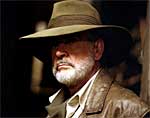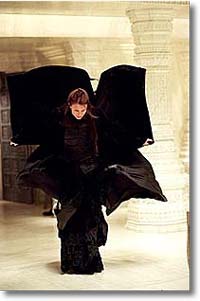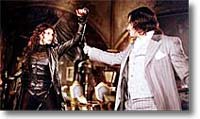The League of Extraordinary Gentlemen
 for intense sequences of fantasy violence, language and innuendo.
for intense sequences of fantasy violence, language and innuendo.
Reviewed by: Charity Bishop
CONTRIBUTOR
| Moral Rating: | Very Offensive |
| Moviemaking Quality: |
|
| Primary Audience: | Teens Adults |
| Genre: | Sci-Fi Fantasy Action Adventure |
| Length: | 1 hr. 52 min. |
| Year of Release: | 2003 |
| USA Release: |



Did you know?
There have been real men with amazing God-given powers? Learn about…
| Featuring |
|---|
| Sean Connery, Peta Wilson, Stuart Townsend, Tony Curran, Jason Flemyng |
| Director |
|
Stephen Norrington |
| Producer |
| Jane Hamsher, Don Murphy |
| Distributor |
Story: Allan Quatermain (Sean Connery), the world’s greatest adventurer, must lead a legion of superheroes the likes of which the world has never seen. Quatermain’s extraordinary League is comprised of Captain Nemo, Dracula vampiress Mina Harker, an Invisible Man, American secret service agent Tom Sawyer, Dorian Gray, and Dr. Jekyll/Mr. Hyde. The League members are staunch individualists, outcasts in fact, with checkered pasts and singular gifts that have been both blessing and curse. Now they must learn to trust each other and work as a team for the very hope of civilization.
It’s unfortunate and ironic that this film can be summarized in the now-famous Sean Connery line from its own promotional trailer: “I’m waiting to be impressed.” “The League of Extraordinary Gentlemen” could have been an excellent film. I spent most of the last half wishing they would have continued in the original costume drama thread ala Sherlock Holmes rather than to forge into some strange post-modern game of cat and mouse.
The original premise is actually quite interesting, as it brings famous literary characters together. Allan Quartermain, the legendary explorer. Dr. Jekyll and his counterpart Mr. Hyde, the man-turned-monster. Captain Nemo and the Nautilus from “20,000 Leagues Under the Sea.” The Invisible Man. Immortal Dorian Gray, and Mina Harker, former assistant to Van Helsing (the famous Dracula hunter). Throw in a notorious fiend from the literary works of Sir Arthur Conan Doyle and a hoard of sly winks at other novels and histories (Around The World in Eighty Days, “The Phantom of the Opera”, and Jack the Ripper) and you have what starts off as a promising film.
In a dark alleyway a number of Victorian policemen are assaulted by a massive iron tank which boldly smashes into the Bank of London and robs not only the vault of its valuable contents but a set of original blueprints of the Venice underground as well. Since the only survivor (left alive to “tell the tale”) heard the thieves speaking German, England launches a series of accusations against their former allies. In the meantime the same gang of roughens seize control of a German laboratory and blow it sky high. Germany believes this to be the work of England—and British Secret Service Agents are frantically attempting to prevent an all-out war.
Explorer Allan Quartermain is sought out in Kenya by a British agent sent to persuade him to help them capture the fiend responsible, known only as “The Fantom.” The legendary hero journeys to England where he is briefed by “M,” a man of high position in the government but no intention to do more than set their plans for a counter-attack in motion. (Viewers are encouraged to believe he is Mycroft Holmes, Sherlock’s older and less physically ambitious brother.) Quartermain’s mission is to bring together an elite crime-fighting team comprised of some of the most notorious individuals of their age and protect the world leaders as they gather in Venice for a secret summit meeting.
Among those already enlisted to join him in battle are Captain Nemo, a Hindi “pirate” and inventor who seeks to right past wrongs, Mina Harker, a former vampire-hunter and scientist, and Rodney Skinner (who, thanks to an invisibility formula with no anecdote, can only be seen when wearing clothing). “M” wants two more to make up the “dream team”—Dorian Gray, an immortal whose fate is tied to a cursed self portrait, and the infamous Dr. Jekyll, whose counterpart Mr. Hyde could be a valuable asset in battling the Fantom. Dorian has already been approached by the British government and turned them down. “M” hopes the reappearance of his old flame, Mina Harker, will change his mind. In the meantime, Jeckyl lurks abroad in Paris, having been run out of England for his violent crimes against humanity.
They have only three days to bring together the League and stop Fantom from rampant destruction. Along the way they’re joined by a spirited American by the name of Thomas Sawyer, a crack shot, fast driver, and doubly suspicious individual. As they journey together aboard the Nautilus, the characters each reveal a different side. Dark secrets, unrequited love, past sins, and old wounds. They will all be called to use their talents against a diabolical evil which, unleashed on the world, could create rampant chaos… and may find themselves unwilling pawns in the process. When a traitor is discovered among them, none of the League may make back to England alive.
LXG looked promising from the trailers and for the first half hour was tolerable. Then it turned just plain strange. The script simply fails to go anywhere—it doesn’t give us any complexities in the characters, seems to wander with no true idea of where it’s leading itself, and comes up with a true stinker of an ending.
How Marvel talked Sean Connery, Richard Roxburg, Shane West, and Stuart Townsend into this will forever remain a mystery. The movie is all about high-action fighting sequences with nothing of depth interspaced between. It’s never a good sign when the villain turns out to be the most fascinating character—and his death isn’t even dramatic. (I might also add “pathetic” and “below him,” considering just who he turns out to be.)
One plot twist did surprise me, but the other was easily foreseen. Since there’s no time for character development, the ending climax wasn’t as poignant as it might have been.
The special effects are fairly decent but are also grotesque. Seeing Jekyll transform into Hyde is a bone-wrenching experience with disgusting results (facial contortions, a massive hunched back, and sinewy flesh). Seeing a character age eighty years in three seconds and have his rotted corpse fall to the floor wasn’t particularly edifying either.
The content is limited to primarily intense fighting scenes, but unfortunately they aren’t even that well filmed. In order to keep the PG-13 rating the director was forced to use choppy editing techniques. The result is that most of the time you can’t see what’s going on and it feels as though you’re inside a video game. The bodies pile up by the ending credits, including several main characters (who may or may not be dead).
Language is mild—limited to some British slang and a few profanities, as well as some innuendo.
The relationship between Mina and Dorian is presumed to be sexual—we see them kissing passionately after he bandages her cut finger with his handkerchief. Minor spoiler: Mina is “turned on” by blood… because in her adventures helping her husband defeat Dracula with the aid of Van Helsing, she was bitten. The beautiful woman is now a vampire with the ability to transform herself into a legion of bats at will. The first evidence of this comes with no warning—when she suddenly turns on an attacker threatening her with a knife and bites him savagely in the neck. The camera briefly lingers on her licking blood from her lips before composing herself.
Conclusion
There were moments when I found the movie enjoyable, but these were few and far between. I found myself wishing they’d taken a much more natural approach and engaged the characters in a psychological battle against evil rather than merely pitting fang against claw.
There are some witty lines, but most failed to get laughs. LXG just doesn’t hold a candle against Spider-Man, which has a much better message for teens and doesn’t have the troubling elements—the presence of a lady vampire (which arguably incorporates “sexualized violence” into the film) and a particularly disconcerting ending which leaves the viewer with the impression that an African witch doctor is resurrecting one of the dead heroes. My only conciliation is that Sherlock Holmes himself never made an appearance, though the film could have used his intelligence and foresight.


[Better than Average / 4]
Sean Connery plays the part of Allan Quatermain and he must lead a group of superheros in defense of the entire world. Each of the superheros is blessed/cursed with an extraordinary talent or quality which makes him (or her) perfect for the undertaking. Some of the backgrounds and contents are obviously computer generated graphics but they are not distracting and blend well with the other elements. Connery plays his part with his usual grace and style. …Even though this movie contains some questionable elements, including Harker and Gray, I would see it again. The story is far-fetched enough to be make-believe but acted out in such a manner as to be entertaining. I would not recommend taking small children to see this film.
[Better than Average / 4]
[Average / 4]
Visually the picture is very intricate in fantastic detail and that was something I loved. The plot is good and never really show. Use of CGI is just right (I get tired of digital characters pretty quickly). The effects are very interesting, especially for the invisible man. There are some light points of humor along the way, too. To gauge if this show is right for you, I’d say its a whole lot better than the Batman movies, and morally on par with The Mummy. It’s definitely a hodge-podge of literary characters that wouldn’t seem to ever go together. But in the end, I thought it was a good piece of fiction and better than average in movie making quality.
[Very Offensive / 4]
The film revolves around a simple plot. It features six characters from English Literature: Allan Quatermain (a hardened adventurer and explorer), Dr. Jekyll and Mr. Hyde (a tortured man who drinks a formula to transform into a hideous beast), Dorian Gray (a handsome man who is immortal and hedonistic), Captain Nemo (the inventor/captain of the great submarine “Nautilus”), Tom Sawyer (an all-American young sharpshooter), Rodney Skinner (a quick-witted, invisible man), and Mina Harker (a beautiful and mysterious vampire). Together, they are known as the “League of Extraordinary Gentlemen”, employed by the British Empire to prevent a world war from starting between Britain and Germany. To do so, they must stop the Phantom, a man who has been holding scientists hostage and developing highly superior weapons of war, and who is willing to sell them to the highest bidder. The story tends to unravel from there, with
…a few twists (though some rather predictable ones) and turns… Overall, the movie is visually enjoyable, and the action kept my attention riveted. The plot, like many action flicks, is rather shallow, though at times it attempts to go deeper. Amidst the swordplay and martial art sequences, there is some interesting talk about the “demons” inside us, trying to recover from the past, and the importance of relationships. There is a theme of self-sacrifice throughout the film. The movie does not push the boundaries of profanity and nudity/sex. Although some of the gentlemen of “The League” seem intoxicated with the only woman, Mina Harker, who sometimes dresses rather skimpily. No sex is shown. There are good life lessons about loyalty, trust, friendship and sacrifice, but there is also betrayal and a little witchcraft (scene with an African witch doctor and Nemo kneels before a statue of the Indian God Kali). Violence, though not graphic, is prevalent throughout. Overall, this film could be seen by a discerning Christian, 14 years and above.
“The League of Extraordinary Gentlemen” is a passable action flick that will not fail to entertain and excite, but will probably fail to leave a very strong lasting impression. Compared to other more violent and sex-infused films of its genre, however, it rises in a league of its own.
[Average / 3½]
[Average / 3]
[Better than Average / 2]
[Very Offensive / 4]
[Very Offensive / 1]
[Average / 4]
